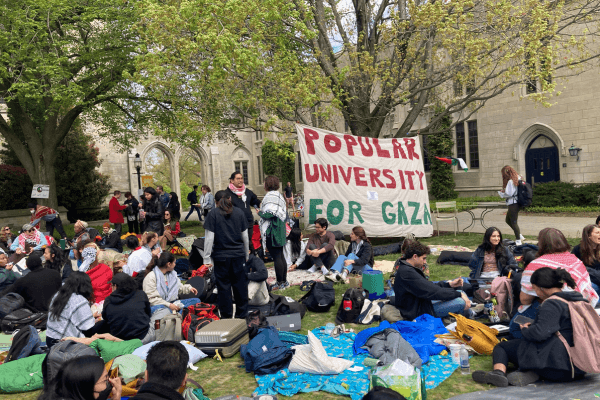Three weeks ago, it seemed impossible that this Congress and this president would be able to get anything significant and lasting done to confront climate change. But this week, President Joe Biden signed major climate legislation — the Inflation Reduction Act — into law.
It’s a bittersweet moment.
The sweet: In late July, more than seven months after Sen. Joe Manchin III (D.-W.Va.) publicly opposed a major climate bill, Manchin and Senate Majority Leader Chuck Schumer (D.-N.Y.) caught me and most of Washington by surprise with the news they had reached an agreement. The act contains the largest investment Congress has ever passed to combat climate change. Experts estimate that by 2030, the act will have helped reduce U.S. carbon pollution to 40 percent below 2005 levels. The bill will also lower health care and drug costs for seniors and about 13 million low- and middle-income Americans. The bill will be paid for by taxing more large corporations and wealthy individuals, ensuring they pay closer to their fair share in taxes. These are meaningful, hard-won accomplishments, especially for advocates and faith leaders who kept pressuring Congress, even when hope seemed lost.
Then the bitter: To overcome political stalemate and partisan opposition, lawmakers cut out much of the bill’s original vision — a vision that would have transformed some of our nation’s most vulnerable families and communities. The original Build Back Better package, which had been significantly shaped by the Congressional Black Caucus, would have put in place some of the most pro-family and racially and economically just policies within a generation, creating an economy in which all American families would better be able to flourish. From the expansion of the child tax credit to guaranteeing parental medical leave to child care, pre-K education, housing assistance, maternal health, and more.
Weeks like these call for two underrated spiritual disciplines: lament and thanksgiving. Lament is what happens when the people of God pause to express profound loss and anguish in the face of suffering or injustice, a practice that “challenges the church to acknowledge real suffering and plead with God” to intervene, writes Soong-Chan Rah in Prophetic Lament. One third of the Book of Psalms expresses this kind of personal or communal lament. The Christian practice of thanksgiving, on the other hand, is what happens when we take stock of what God has done, giving thanks and offering praise. In the Bible, this sounds like Psalm 150 (“Let everything that has breath praise the Lord”) and the Apostle Paul’s timeless prescription to not be “anxious about anything, but in everything by prayer and supplication with thanksgiving let your requests be made known to God” (Philippians 4:6). When practiced together, lament and thanksgiving can empower us for the ongoing struggle to address all the things the IRA left out.
Following Rah, the real suffering we need to acknowledge this week is that much of what was cut from the original bill would have disproportionately benefitted Black and brown Americans, as well as people experiencing poverty. For example, the IRA fails to expand the child tax credit provide universal pre-K, enact universal paid family medical leave, and make child care more affordable. Neither did the bill include a provision to close the health care coverage gap for more than 2 million people experiencing poverty, 60 percent of whom are people of color, in states that have refused to expand Medicaid — a provision that I and many of Sojourners’ faith leader allies fought hard to include. Noting that the act eliminated most of the robust support for impoverished and marginalized communities, Sojourners’ founder and current director of the Georgetown University Center on Faith and Justice Jim Wallis rightly observed last week that “the politics of Jesus is mostly absent in the politics of Washington.”
So let us together lament that Congress took universal access to childcare and pre-K off the table months ago and that paid family medical leave has become a dream deferred. We lament that the expansion of the child tax credit — which successfully lifted 3.7 million children out of the quicksand of poverty — has not been renewed. We lament that so many housing and other health care provisions that would help us build a more just and caring economy were sacrificed at the altar of political compromise and a lack of courage and imagination. The aptly named book of Lamentations says it well: “Arise, cry out in the night, as the watches of the night begin; pour out your heart like water in the presence of the Lord. Lift up your hands to him for the lives of your children, who faint from hunger at every street corner” (2:19).
We can also lament the worsening political dysfunction caused by hyper-partisanship and our nation’s toxic polarization, which made such compromises necessary. Thanks to nearly unanimous Republican opposition to Biden’s agenda and the unwillingness of moderate Democratic senators like Manchin and Kyrsten Sinema (Ariz.) to change Senate rules to make it easier to pass laws with a simple majority, it has been impossible for the Senate to pass the bolder and more comprehensive version of this agenda. As a result, the Senate needed every single Democratic vote to pass legislation, giving Manchin and Sinema outsized power to exclude key provisions, many of which would have benefitted the most vulnerable.
Yet amid it all, we give thanks: Praise God for the countless number of faith and justice advocates who, through sheer persistence, secured meaningful legislation to address climate change. I give thanks for the resilience of the Biden administration and so many members of Congress who persisted with negotiations even when this bill had been declared dead or was on life support. I sing songs of hallelujah for the ways in which this act will protect our planet and the livelihoods of future generations by incentivizing long overdue shifts to renewable energy.
Our lament, followed by our celebratory thanksgiving, will empower us as we continue to push for the kind of policies and political priorities that will treat everyone’s needs as holy and enable all families and communities to thrive with dignity.
Got something to say about what you're reading? We value your feedback!








